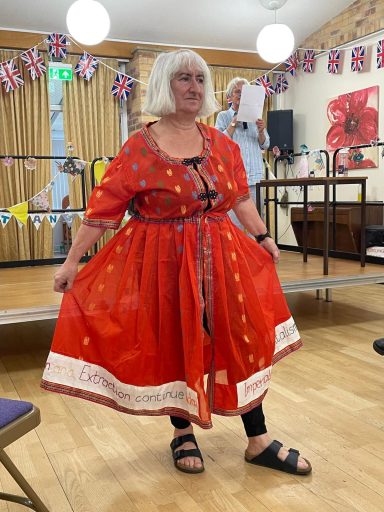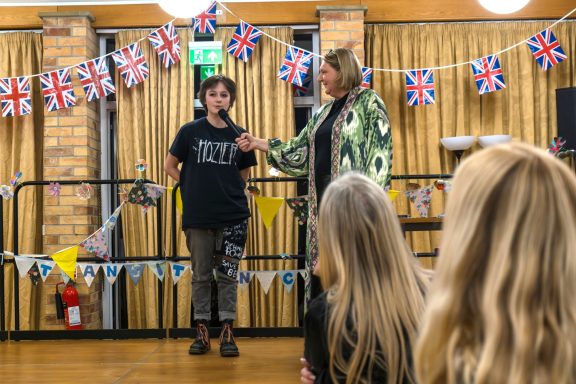Love it Again Fashion Show
May 2025
Sustainable Fashion Show highlights - upcycled finds and anti-fast fashion!
Crich Community witnessed a truly inspiring and thought-provoking event: a sustainable fashion show run in collaboration with New Mills Fashion Activistas.
The show wasn't just about clothes; it was a powerful statement against fast fashion and a celebration of creativity, craftsmanship, and conscious consumption.


Charity Shop Style with a Message
New Mills Fashion Activistas presented an awe-inspiring collection crafted from upcycled charity shop finds.
Each piece was transformed into a unique work of art, adorned with embroidered poetry and images that supported their anti-fast fashion message.
The collection boldly addressed critical issues like the unacceptable working conditions prevalent in the garment industry, while simultaneously highlighting the artistry and skill involved in clothing design.
Three Acts of Fashion Revolution
The show unfolded in three compelling acts, each speaking to the problems of the fashion industry as well as potential solutions:
- Act 1: Exposed the dark side of fast fashion, highlighting its environmental impact and human cost.
- Act 2: Showcased the transformative power of upcycling and the joy of discovering unique treasures in second-hand stores.
- Act 3: Celebrated the beauty of cherished inherited pieces and encouraged a mindset of 'loving it again' – repairing, restyling, and rediscovering the value in our existing wardrobes.


Community Catwalk
The show wasn't just a passive viewing experience; it was an energetic and interactive celebration of personal style.
Audience members were invited to share their own curated outfits and the stories behind them, creating a vibrant sense of community and shared purpose.
The evening was filled with clothes swapping, raffle, displays of upcycled garments, and heartfelt admiration for each other's creative expressions.
Pieces in the final act included a cloak made out of embroidered squares created by children from Crich Juniors and Crich Luncheon Club and Jasmine's embroidered message spreading jeans, which she created as part of her King's Scout Award.
Members of the audience made individual pledges on how they were going to change the way they approached fashion. The pledges were written on cloth that had been rust dyed by members of Crich Youth Club and pinned on to a ball gown made from hessian sacks, making a final statement to close the evening’s proceedings.
Thank you!
A huge thank you to everyone who contributed to the success of this unforgettable event.
The event was produced by Neighbourhood Creative Agent Clare Limb and Linda Philo, whose overall vision for the project brought together the community of the Crich Area and beyond. It was funded through Make/Shift, the Creative People and Places programme for Arts Council England alongside funds from Transition Crich. The evenings programme was curated in close partnership with New Mills Fashion Activistas and a dedicated group of local volunteers. Thank you to John Felix Media for the photos.
Special appreciation to Gail Saxton, Crich Hair and Beauty, Lise Bennett, Cheryl Porter, Mig Holder, and Make/Shift Amber Valley for their generous raffle prize donations.
Finally, heartfelt gratitude to New Mills Fashion Activistas, the 70 attendees and 25 volunteers whose passion and dedication made this extraordinary evening possible.
Your support is invaluable in driving the movement towards a more sustainable and ethical fashion future.


Discover the facts!
- Fast fashion uses vast amounts of the earth’s valuable resources – land, water, energy, and raw materials, and cause dreadful pollution both in manufacture, transportation and disposal.
- Fast fashion also exploits workers, paying them poor wages and forcing them to work in dangerous conditions. Yet in the past 10 years the number of items purchased per consumer has more than doubled.
- Every year around half a million tonnes of plastic microfibres shed by washing synthetics such as polyester, nylon or acrylic end up in the ocean.
- Every year textile production uses around 93 billion cubic metres of water and produces an estimated 1.2 billion tonnes of greenhouse gas emissions. This is more than all international flights and maritime shipping combined.
- 1 in 6 of the world’s workers are employed in the fashion industry and the majority are female. Fast fashion relies on cheap labour and many of the workers live in extreme poverty. Employment and human rights violations are commonplace.
- To find inspiring and useful solutions, visit climate.film/fast-fashion
Some solutions
- Reject fast fashion by buying less clothes
- Choose clothing made locally or from sustainable fabrics
- Consider buying second hand clothes from local charity shops or platforms like vinted.co.uk
- Rent clothes that you would only wear occasionally
- Swap clothes with friends. Transition Crich hold a quarterly clothes swap at our Share & Repair Cafes
- Look after your clothes and buy pieces that will last longer than 30 wears.
- Choose classic, well-made items that can be worn for years, rather than trendy, low-quality fast fashion pieces
- Learn basic sewing skills to repair clothing and extend its lifespan, or repurpose old clothes into new items. Come along to our Make, Do & Mend skill shares to find out how.
- Finally, Love it Again! fall back in love with the clothes already in your wardrobe!










